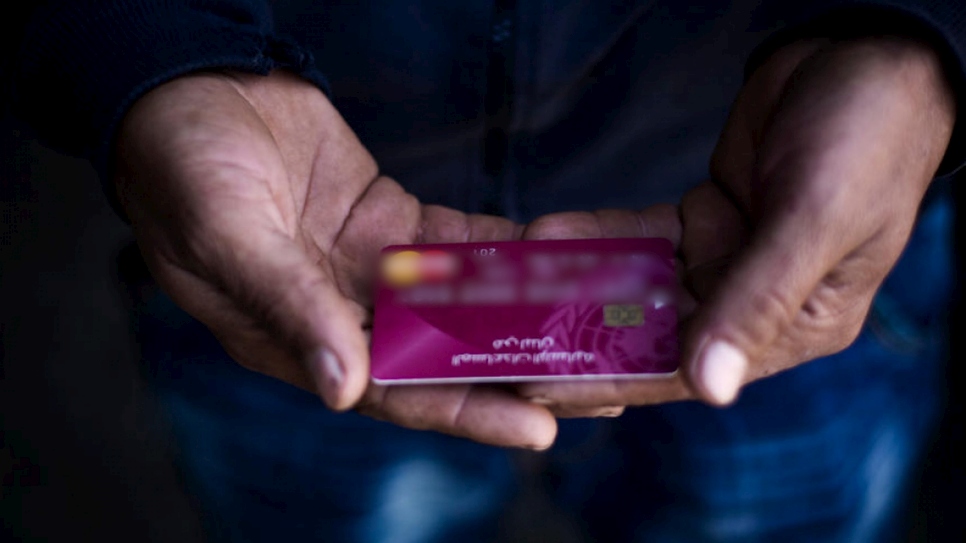Hundreds of thousands of impoverished Syrian refugee families in the Middle East risk losing their main financial lifeline from this summer, unless urgently needed additional resources are found to plug a US$270 million shortfall – part of a wider US$4.1 billion funding gap in the UN-led response plan for Syrian refugees in 2018.
Syria’s seven-year conflict continues to fuel the world’s largest refugee crisis, with more than 5.6 million people forced into prolonged exile in neighbouring countries. Each year sees families driven deeper into penury, with the vast majority of refugees in Jordan and Lebanon now living below the poverty line and unable to meet their basic needs.
UNHCR, the UN Refugee Agency, currently provides much-needed cash assistance to the most vulnerable families – mainly in Jordan and Lebanon – to help them cover the cost of shelter, heating, healthcare and other essentials. But with current funding for UNHCR and other UN cash assistance programmes set to run out from May onwards, almost a million people face losing this vital assistance.
“The cash assistance allows me to pay for my children’s school transport.”
The warning comes ahead of a major EU and UN donor conference in Brussels on 24 and 25 April, aimed at securing fresh funding pledges to support Syrians and the main refugee hosting countries. Total requirements for 2018 are set at US$5.6 billion, but as of the end of March the UN-led appeal was only 27 per cent funded, leaving a US$4.1 billion shortfall.
Cash assistance is a key element in UNHCR’s response to the crisis. By enabling refugees to prioritize spending on their most pressing needs, it offers greater dignity and freedom of choice while also providing a boost to the local economies in areas shouldering the burden of hosting large numbers of refugees.
UNHCR’s use of state-of-the-art biometrics and vulnerability targeting systems ensures cash assistance is securely delivered to those people who need it most, in the most cost-efficient way.

Cash assistance restores dignity for refugees in Lebanon (Rima Cherri, producer / Houssam Hariri, camera-editor / Photo: Diego Ibarra Sánchez)
In Lebanon, where 58 per cent of the nearly one million registered Syrian refugees live in extreme poverty on less than US$2.90 per day, cash assistance helps to support some 33,000 of the worst-off families.
Manar, a 29-year-old mother of three from Homs now living in Baabdat – a town in the Mount Lebanon range overlooking the capital, Beirut – came to the country in 2013 following eight months of displacement inside Syria. Her husband was killed in a car accident in 2015, leaving her alone and struggling to care for her kids.
While trying to secure some income through unskilled labour to help cover the rent and bills, Manar says that since she began receiving US$175 a month in assistance, it has helped her provide what she hopes will be the foundation for her children’s futures.
"Their vulnerabilities are increasing and we are barely maintaining the level of assistance."
“The cash assistance allows me to pay for my children’s school transport,” she explained. “I always tell them that I won’t be able to leave them an inheritance after their father died. But I can secure them an education, and through education, they can get whatever they want.”
“Refugees like me have different needs and different ways of spending,” she added. “Sometimes their children fall ill and they need to take them to the doctor. When you give them the cash, you are giving them the freedom to have the money when they need it the most.”
Even before the current funding crunch, UNHCR's Representative in Lebanon, Mireille Girard, said the fact that available resources had failed to keep pace with deepening poverty among refugees meant many needy Syrians were already missing out.
“The problem we have is that we should be helping 76 per cent of the population, but we are helping only a portion of the 58 per cent below the extreme poverty line,” she said. “At the moment, their vulnerabilities are increasing and we are barely maintaining the level of assistance we had the previous year.”
